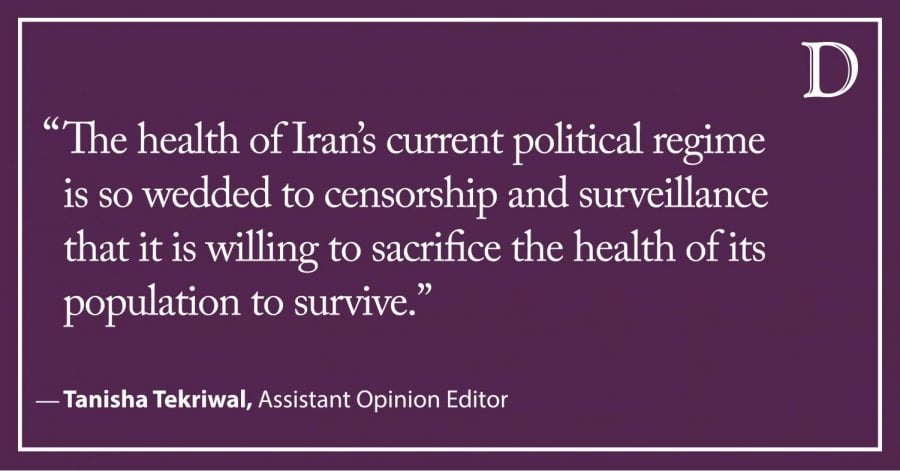Tekriwal: The Information War We Need To Be Fighting
May 14, 2020
I’m a supporter of women leaders. But the trope of how the countries with the best COVID-19 response are women-led is a tired one.
This feeble correlation overlooks many key elements in the formula to efficient governance. Planting a woman on top of a distressed and broken system isn’t going to fix it— there must exist some components of democracy and equality for a patriarchal society to choose a woman leader. Two of these are the twin-features of transparency and privacy.
It may seem like a long shot, but looking closely at the COVID response of all the countries who may appear on the scale of ‘success’ (though what the word even means in this new era is another debate entirely), it is evident that none of them lied to their citizens or sought to consolidate a surveillance empire.
It would be shortsighted to start in a place other than the United States in this respect. It is entirely obvious that the U.S. is drowning and the designated ‘lifeguard’ of this metaphor — the president — is looking in the other direction.
Even as staunch an advocate of universal health care as I am, I don’t believe the lack of accessible health care is the most significant failure of the U.S. in this pandemic response. Many nations have weak or developing health infrastructure, but somehow do not find themselves in the American position. This I would attribute to the open lies told by the President.
Irresponsible is the only word to describe the President’s active choice to lie to a public that he knows relies on him for information. If the large swaths of people had been exposed to the legitimate fear of the virus, perhaps the curve could’ve been flattened. That many in the White House refuse to don masks serves only to prove my point.
The U.S. isn’t an isolated example when it comes to lack of transparency and privacy. When the pandemic first emerged, Italy and China dominated the news due to their scramble to respond to the crisis. Iran grazed the news for a while, but has only done worse since then. While some political analysts have said that the Iranian government acted in a timely manner and did not do too badly, especially given the uncompromising economic blockade instituted by the US.
Many more, however, have critiqued the Iranian response. Strictly statistically speaking, Iran isn’t doing as bad as it could be. What should be most worrying here is that we have no way of knowing anything for certain. The health of Iran’s current political regime is so wedded to censorship and surveillance that it is willing to sacrifice the health of its population to survive. The Committee to Protect Journalists list of the most censored countries ranks Iran’s networks just two spots away from the famed Great Firewall of China.
Which, of course, brings us to Beijing. Though it is not for me to judge the validity of (primarily right-wing) theories that China has been hiding its true COVID-related data from the world, I must acknowledge both the possibility that these theories hold some truth, given the country’s track record, and the fact that it has successfully started to reopen without collapsing. Regardless of what ground it has covered months into the pandemic, it is undeniable that the Chinese government failed its people at the inception of this crisis. What is confirmed by many sources now is that the administration held back a lot of information regarding the outbreak when it first transformed Wuhan. The six important days that it dithered cost it important whistleblowers, thousands of lives and its international reputation. It is no question that many Chinese citizens shall soon be asking seminal questions of their government, if they aren’t already.
It is only now fitting to give some time to China’s quickly learning neighbour. It is difficult for me to not circle back to India when every day, I find myself more and more appalled by the incompetent government that my country elected. That India’s COVID numbers are a severe undercount due to woefully low testing rates is incontestable. What is tearing the country apart, though, is the government’s slow strengthening of its surveillance techniques and avenues. Already the infamous WhatsApp groups— Fox News for Indian boomers— have helped facilitate the circulation of fake news. Add to this the fact that an article criticising the government was taken down, and you have a damn good sketch of authoritarianism. And this is still not the full picture: enter Aarogya Setu. The government is encouraging— near-forcing— citizens to download this app to keep track of COVID. However, its undisclosed data-collection policies and the fact that it is a blatant violation of privacy, makes it obvious that it is nothing but a loosely-disguised ploy to keep tabs on Indians. Moreover, what a gross miscalculation of privilege (the privilege of having a smartphone with internet) by a government that claims, time and again, that it is for the average citizen.
What these countries have in common is obviously a stunning failure to communicate critical information about the crisis. These portraits of different countries are all eerily pointed in the same doomed direction of state-manipulation of public information and state-control over private lives.
Many think that the next step for governmental success is to elect a woman leader. However, if nations want to be able to reach that level, they must prioritize putting their citizens first.
Tanisha Tekriwal is a Weinberg freshman. She can be contacted at [email protected]. If you would like to respond publicly to this op-ed, send a Letter to the Editor to [email protected]. The views expressed in this piece do not necessarily reflect the views of all staff members of The Daily Northwestern.


